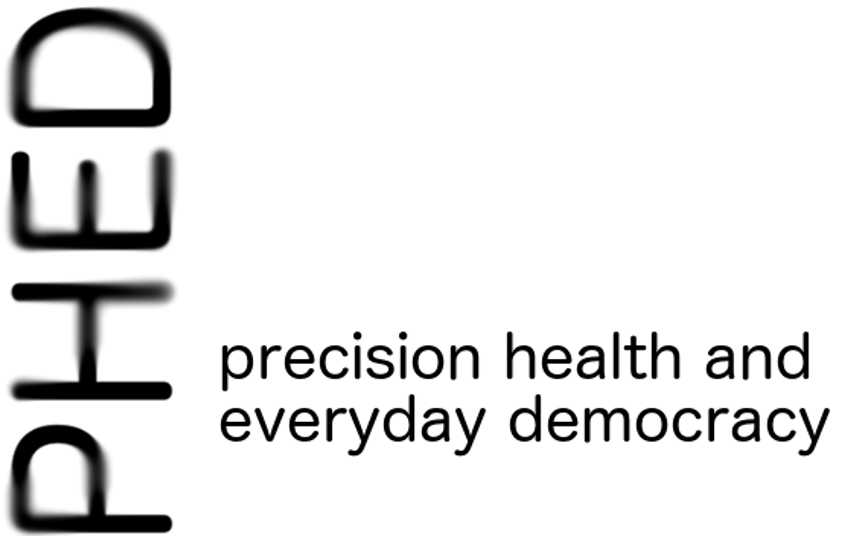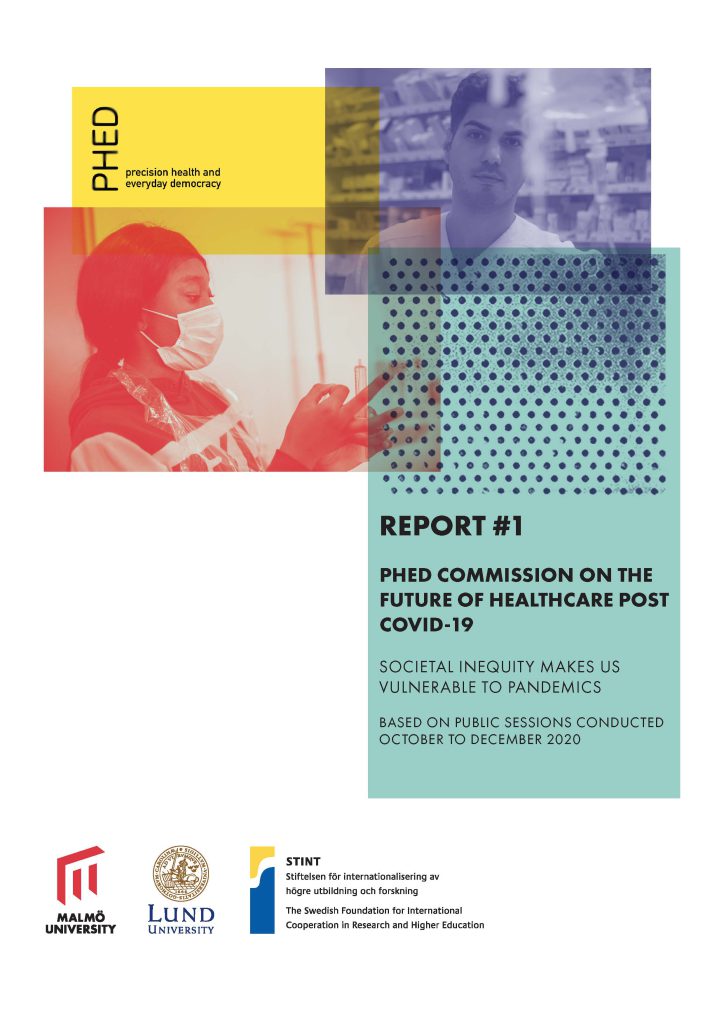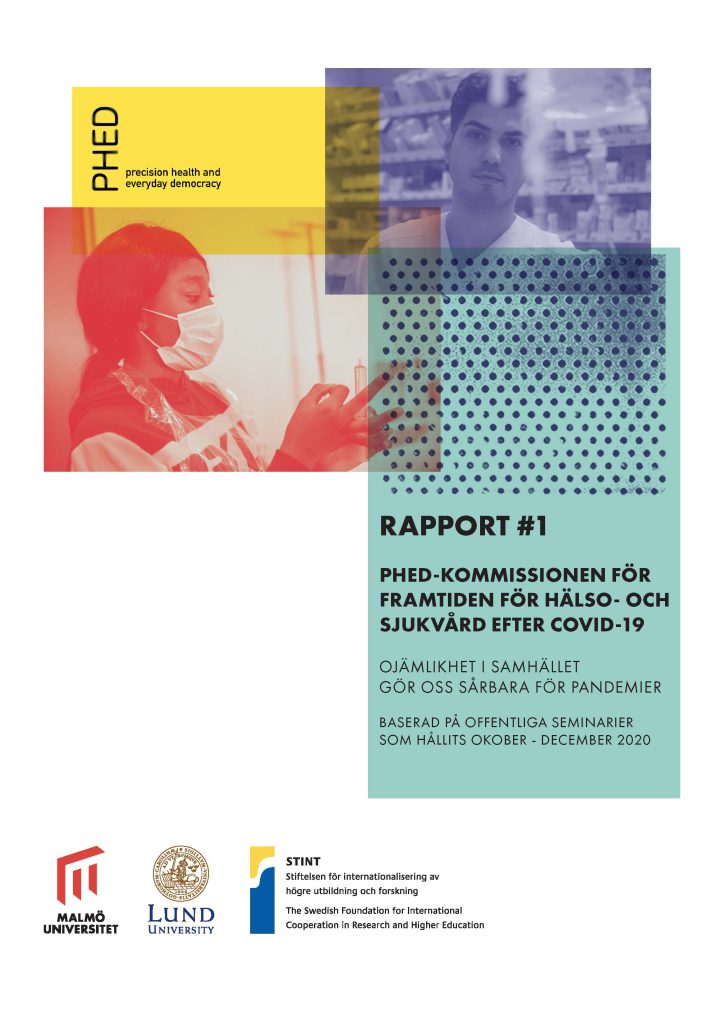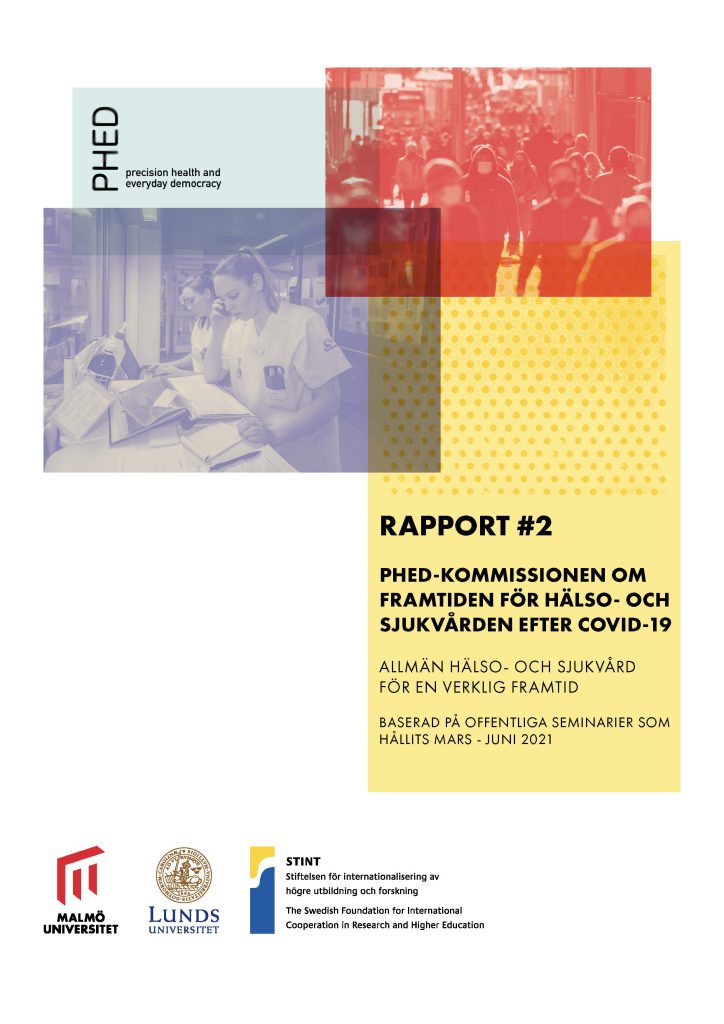Amongst the tragedy of Covid-19 we also heard stories of human strength and ingenuity battling against an unprecedented pandemic. What can we learn from those working with the most vulnerable groups? How did those tasked with making the healthcare system function so not more lives were lost face that challenge?
During Autumn/Fall 2020 and Spring 2021 the PHED Commission sought to archive some of these experiences by meeting online with a broad range of individuals working in medical clinics, civil society organisations, academic research, as well as governmental bodies. Those who gave oral testimony to the Commission represent a wide geographic area, with our initial focus on Sweden – with an advanced healthcare system – expanding to include a global reach.
You can read summaries of what we learnt by clicking on the relevant report above…
…and watch videos of the live recordings by clicking on the topics you find interesting.
Autumn/Fall 2020
Ensuring Equal Access to Health: Lessons from Covid-19
Lina Al-Nahar, Founder and project leader of Artcovid and research assistant at the Faculty of Medicine, Lund University
Solvig Ekblad, Professor of Multicultural Health and Care Research at Karolinska Institutet andlicensed psychologist at the Academic Primary Health Care Center in Stockholm, Sweden.
Lina al-Nahar’s presentation addresses unequal health, exclusion and the importance of accurate communication/information. Lina is the founder and project leader of Artcovid, an interprofessional working group for adjusted health information regarding Covid-19. During the spring the Public Health Agency of Sweden had the responsibility to keep the population informed regarding the virus but not everyone had the possibility to adapt to the recommendations. Lina saw the need for adjusted information to some populations. Her work has developed collaborations between different professions in both Lund, Gothenburg and Stockholm. Lina is also a research assistant at the Division of Occupational and Environmental Medicine of Lund University. She has been interviewed in Swedish newspapers such as Sydsvenskan, Expressen, Dagens arena as well as Radio Sweden.
Solvig Ekblad presents her ongoing project “Protective measures against Covid-19: A Qualitative study of barriers and own strategies in vulnerable areas and evaluation of participation of participants in a revised and meaningful information on infectious disease”. Solvig has vast experience, among others working as a group leader at the Stress Research Institute, as guest professor at Malmö University and co-directing the two-week Harvard course “Global Mental Health: trauma and recovery”. She has a long list of publications and many international collaborations. She is a member of the “Right to Care Initiative” and has engaged in the debate regarding migrants and health in society, with various articles published in Swedish national newspapers and the Swedish Physicians’ Magazine (Läkartidningen).
27th October 2020
Anna Bredström, Linköping University
Frances Webber, Institute of Race Relations, UK
Frances Webber’s talk How Institutional Racism Damages Migrants’ Health will present the Institute for Race Relations’ (IRR) submission to the Permanent People’s Tribunal hearing on violations of migrants right to health which took place in Berlin in October 2020. Webber is a UK-based human rights lawyer whose work with the Institute of Race Relations (IRR) stretches over several decades. She is the author of Borderline justice: the fight for refugee and migrant rights (2012) as well as numerous papers including co-authoring Unwanted, Unnoticed: an audit of 160 asylum and immigration-related deaths in Europe (2015).
Anna Bredström presents her article-in-progress called Conceptual unclarity about Covid-19 ethnic disparities in Sweden – implications for health policy. Analyzing the discourse around ethnic difference in relation to Covid-19, she will focus on how these differences are interpreted differently by experts and others in decision-making positions, and what these different understandings of ethnic health disparities may have for handling the pandemic. The talk relates both to precision medicine and the discussion around multicultural health care and equal health.
November 16th 2020
Health Equity during Covid-19: Experiences from Regional Policy Advisers and Civil Society
Mia Sandor, MSc Public Health, Centre of Excellence Migration and Health of Skåne Regional Council
Micaela Nilsson, Pediatric Nurse, Centre of Excellence Migration and Health of Skåne Regional Council
Nicolas Lunabba, head of the youth organization Helamalmö
The organization Helamalmö hosts one of Malmö’s largest meeting places for the city’s youth. Aiming for a socially sustainable society their work has been widely acknowledged in the past years and said to have contributed to increased sense of safety in the area Nydala. During the pandemic, Helamalmö’s meeting place closed down and reorganized to aid the neighborhood’s risk group. Nicolas Lunabba, head of the organization, will address their work in his presentation.
As part of Skåne Regional Council focusing on issues around migration and health in health care, Mia Sandor and Micaela Nilsson will share the centre’s experiences and lessons regarding activities and strategies for covid-19. The Centre of Excellence Migration and Health is part of Skåne Regional Council with the task to strengthen knowledge about issues related to migration and health for health care employees and to promote migrant-inclusive health care.
November 23rd 2020
Housing Inequality and Civil Society during Covid-19
Martin Grander, Urban Studies researcher at Malmö university and
Louise Dalingwater, professor of British politics at Sorbonne University.
1) How inequalities in housing affect the pandemic and how the pandemic aggravates housing inequality. Martin Grander shares his recently published work for the Delegation Against Segregation (Delmos) on the importance of housing and the divergent effects of prevailing housing inequality during Covid-19. Many households with good finances have been able to look for homes with access to a garden or secondary housing in rural areas as a result of more extensive work from home and canceled holiday trips. In the other end, people in households with weak finances are more overcrowded and have difficulty avoiding the infection both at work and in the home environment. The consequences of these disparities will be addressed in the seminar.
2) Grass roots organizations and marginalized migrants in the UK and France Louise Dalingwater is a member of the Precision Health and Everyday Democracy network. She will share the role of civil society in ensuring provision of health and social care to marginalized migrants during Covid-19 and the obstacles they encounter in their work. Her examples will be mainly from France and the UK.
December 8th 2020
Spring 2021
Researching Global Health Inequality
Terje Eikemo and Emil Øversveen. Centre for global health inequalities research (CHAIN https://www.ntnu.edu/chain/). The session discusses how human health is impacted by other social goods, like access to education, as well as the history of global health inequalities research as a field seeking to enhance human well-being and social justice.
Tuesday 16th March 2021
The Role of New Technologies in Health Equity
Stefanos Spaneas, University of Nicosia;
Dario Salvi (MobiStudy research platform) and Dr Dipak Surie, Malmö University.
The session provides a comprehensive overview of the types of applications through which healthcare access and efficacy can be enhanced, as well as considering the potential for increasing access for marginalised groups, including newly arrived refugees.
Tuesday 30th March 2021
Is Global Health Coverage Possible?
Jozef Bartovic, Division of Country Support and Emergency, Preparedness and Response, World Health Organization Regional Office for Europe
Robert Yates, Director, Global Health Programme, Chatham House, Royal Institute of International Affairs; Executive Director, Centre for Universal Health.
With an introduction by Kerstin Tham, Vice-chancellor of Malmö University.
The economic and societal impact of the Covid-19 pandemic shows that a lack of healthcare for some, threatens the security of everyone. However, this realisation runs counter to a world of increasing inequality and in which vulnerable groups like migrants are often excluded from healthcare.
Tuesday 20th April 2021
Intersectionality in Health Inequality and Covid-19
Lisa Bowleg, George Washington University.
Alyna Smith, Senior Advocacy Officer – Health, Justice & Legal Strategies, PICUM.
Covid-19 has worst hit the richest countries in the world, but within those countries it is the marginalised groups that have paid the largest price. This session welcomes presentations from two globally renowned experts on the impact of health inequities upon marginalised groups, with a particular focus on race, as well as irregular citizenship.
Tuesday 27th April 2021
Civil Society in Health Equality – Refugees and Covid-19
Johanna Saunders, Senior Advisor, Swedish Red Cross. Also see their report on health access during Covid-19.
Elli Xenou, Doctors of the World, Greece.
Civil society has proved essential during Covid-19, whether seen as a supplement to the state or, rather, a temporary solution to a wider process of retreat by public institutions from social welfare provision. This session hears from experienced experts active within two of the world’s most respected civil society organisations.
The Role of Public Knowledge and Government Regulation in Achieving Good Healthcare
Brett Craig, Consultant,
COVID-19 Vaccine Acceptance and Demand, World Health Organization, Regional Office for Europe
Mahama Tawat, Research Fellow,
Montpellier Advanced knowledge Institute on Transitions (MAKIT),
Montpellier University
Lee Jones, Queen Mary University of London.
Public perceptions of health and medical advice remains a constant issue within attempts to both encourage sensible precautions to reduce the spread of Covid-19, as well as ensuring sufficient uptake of vaccinations. Yet, we have
seen examples of disinformation at the very highest levels of government, whether over the seriousness of the pandemic, or how to ensure optimal distribution of vaccinations. This session will discusses these issues with respect to
the global situation, as well as drawing upon examples from a few key states, including the UK.
Undocumented Migrants and other Marginalized Groups during the Pandemic
Henry Ascher, Professor and medical doctor and a part of the board for Rosengrenska in Gothenburg
Margareta Rämgård, associate professor at Care Science, Malmö university and PI for Equal health – Community health promotion in collaboration.
Rathi Ramji, PhD student at Care Science, Malmö university
This session heard from researchers involved in studying both the unequal impact of Covid-19 on marginalised groups like undocumented migrants, but also the role of everyday individuals in building resilience against the pandemic.
Tuesday 15th June 2021




